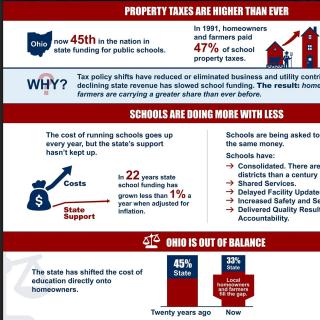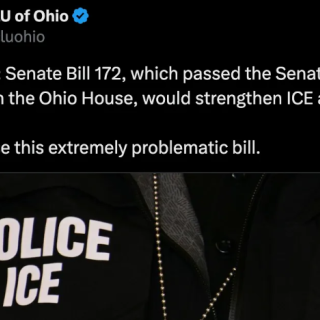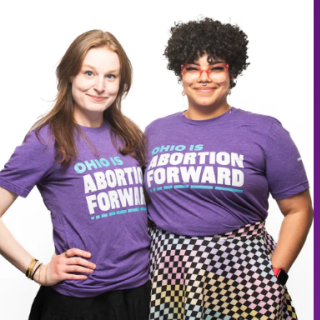Advertisement
Everyday People for Positive Change, a citizen ballot issue committee, announces that yesterday (October 30th) the group submitted a certified pre-circulation petition to the City Clerk for a proposed ballot issue to reform Columbus City Council. The proposed charter amendment would continue the effort to bring Columbus’s antiquated council make-up up to date to fully and unquestionably comply with the Voting Rights Act of 1965 and its prohibitions against “minority voter dilution,” which question was raised to Columbus leaders by the NAACP Legal Defense Fund in a series of communications in 2017.
The proposed charter amendment would:
1. Create a 9 member council effective January 2020 (2021 elections)
2. Require each member to live in one of the districts and be elected by the voters of the district in which each resides.
3. Establish the initial apportionment plan, outlining the 9 districts.
4. Reform the appointment process by allowing votes by the city-codified Neighborhood Area Commissions to nominate candidates for vacant council seats, and strongly encourage council to select the locally-preferred nominee. (If council selected someone other than the locally-supported nominee, the council appointee would be disqualified from holding office after the next election.)
5. Set term limits of 12 consecutive years.
Following are quotes by several of the petition committee members for your use in print:
Clintonville resident Miriam Abbott says, “I am excited to be part of this. Columbus voters have waited a long time for true district representation, and the accountability it creates. As taxpayers, we want representatives who are accountable to our neighborhoods. Right now, at-large voting ensures that our officials answer only to powerful donors with funding to support million-dollar city-wide campaigns. We've seen what at-large voting builds: Look at our communities without representation. We can't afford it any more."
Franklin Park resident and community development expert Jonathan Beard says, “as a lifelong Democrat and the elected ward 55 committee member of the Franklin County Democratic Party, I look forward to the party joining us in re-committing the party to the fair election values it supported in 1968 and in 1975, when local Democrats led an unsuccessful fight against Republican opposition for a 13 district council in an effort to comply with the Voting Rights Act of 1965. More than 50 years after the Edmund Pettus Bridge and passage of the federal voting rights act, It is shameful that our local elections are being questioned by the NAACP Legal Defense Fund for their potential to ensure that geographically concentrated minority voter can always have their candidate preferences over-ruled by the majority. The so-called reforms pushed by City Hall in 2018 simply continue the same unfair electoral system that disempowers Columbus voters and elevates the power of the wealthy over everyday people.”
Near Southside resident David Harewood says, “The city of Columbus has diverse needs among its nearly 900,000 residents, and for too long our city government has relied on an antiquated system to meet our collective needs. The at-large system under which it currently operated has not only had concerns raised about it by the NAACP Legal Defense Fund in 2017, but has come under legal scrutiny in the past in similar cities. This proposed change to the Columbus City Charter will ensure that our city Government is accountable to the people they serve, rather than the vote-diluting at-large system under which it currently operates. The charter amendment we propose here will not only ensure more accountability and access to our elected representatives, but it will free those seeking office to serve the people of his or her district rather than the large corporate interests that currently fuel the incumbency.”
Other petition committee members include: Willis Brown, Asad Shabazz, Tyrone Thomas, Charles Traylor, and Ernest Whitted.
For more information, please contact Jon Beard, at (614) 395-1946.
ON BACKGROUND
In 1912 the Ohio General Assembly passed a law allowing local communities to establish charters and operate by local, rather than state law. In 1914, the City of Columbus adopted a charter, with the campaign headed by Hugh Huntington, out of the Chamber of Commerce offices. The charter established a 7 member council, which the Franklin County Democratic Club opposed, saying such a council would be opposed to the common interest and dominated by business men.
The effect of the at-large system was summarized by CJ Lentz in Columbus : America’s Croossroads. Although four African Americans had been elected to the 18 ward council in effect prior to the 1914 charter, Lentz says “It (the at-large election format) eliminated entire classes of persons from the opportunity to hold office, many of the poorer and ethnic minority neighborhoods candidates from one of the segments of the population simply can not get elected.” In fact, no African American was elected to the at large city council until 1969.
The Voting Rights Act of 1965 made such at-large elections problematic. Section 2 of the VRA prohibits “unusually large electoral districts” which cause “minority vote dilution.” In response, first term Democrat council member James Baughman and James E. Jones a political director for Mayor Sensenbrenner led a May 196 8 effort and persuaded the council (controlled 5-2 by Democrats) to put a 13 member council with 13 members, 7 elected by District and 6 elected at large. Mayor Sensenbrenner supported it, the Democratic Party remained neutral, Republicans opposed. The arguments would sound very familiar today. The issue was defeated at the ballot box, and in 1969 Dr. John Rosemond became the first Black electedto council since the 1914 charter amendment.
In 1975 the district issue appeared on the ballot again, put there by a vote of council. This proposal called for an 11 member council with 6 by ward and 5 at large. John H. Rosemond, the first African American major party to run for mayor, championed the issue which was supported by the Democratic Party, Incumbent Republican Mayor Moody opposed it as did the Republican Party. Both Rosemond and the issue were defeated. There was a strong racial divide about the issue.
While the issue was studied several times since, it was not acted upon until in 2014 Columbus Citizens for Responsible Government introduced a citizen initiative to reform city council. That proposed issue did not make the ballot.
In 2016, a citizen initiative led by ballot issue committee Represent Columbus sought to put a 13 member council on the ballot (3 at large and 10 from districts). After a $1.1M campaign in opposition known by insiders for its false narratives, the issue failed badly at the ballot. That issue (Issue 1, in August 2016) was the only citizen initiated charter amendment to ever qualify for the ballot in the charter’s 100 year history). As part of its opposition to the issue, the city proposed to later form a Charter Review Commission to review and update the city’s charter, using “best practices.” In 2017, instead of using “best practices,” the commission came forward with a strange recommendation to increase the size of council to 9 members, each of whom must reside in one of nine districts -- but bizarrely each of whom would be voted on by the entire city (at-large).
Far from being a “best practice,” this form of government is found in only three other American cities, Tuscon, AZ, and Sparks and Reno, NV – all much smaller than Columbus. And in fact, at the time of the recommendation, the Tuscon system had been sued, because 33 times since 1950, the citywide vote overwhelmed district vote preferences. Based on that lawsuit, the Nevada state legislature was re-writing the charters for Reno and Sparks at the time the CRC was studying the issue and making that “best practice” recommendation.
In 2017, the NAACP Legal Defense Fund, which had twice visited Columbus at the invitation of Everyday People for Positive Change and met with over 30 people and also presented at a public workshop hosted by the OSU African and African American Community Extension Service (although no city official would meet with the storied civil rights law firm) became aware of the Charter Review Committee recommendation, and in a November 17, 2017 letter the LDF said about it “while this proposed voting structure may create the perception that voters will have a representative chosen by a neighborhood community, the maintenance of the underlying at-large voting scheme for all members of the city council will continue to unfailingly diminish the voices of Black voters in Columbus.”
Given the city’s refusal to discuss the issue, Everyday People began gathering petition signatures for the same 10 districts/3 at large format of the 2016 Represent Columbus ballot issue. and with 42,500 petitoin signature gathered secured sufficient valid signatures to qualify for the ballot. The council refused to put the issue on the ballot, saying it violated the single-subject provision the city had put in the charter pursuant to the 2014 initiative petitions, and EDP sued in the Ohio Supreme Court, ultimately losing in a 4-5 split decision. On the same day EDP sued, the Council -- with brand new member Emmanuel Remy providing the final needed vote on his first day on council – voted to put the Issue 4, the strange 9 members district/at-large issue, on the ballot. That issue passed handily with neither a campaign for, nor a campaign against, the issue, to take effect in 2024.
Note: Columbus is the largest American city to retain all at-large council format after Austin voters moved to districts in 2016. While Columbus is the 15th largest city, Cincinnati is America's 35th largest city at about 40% of the population of Columbus. Cincinnati residents are now pursuing a ballot initiative to move from their all at-large format to a mixed form that includes districts along with at-large seats.
Everyday People now seeks a ballot issue to amend the voter-approved 9 district/at-large council, to have 9 members elected by district.



